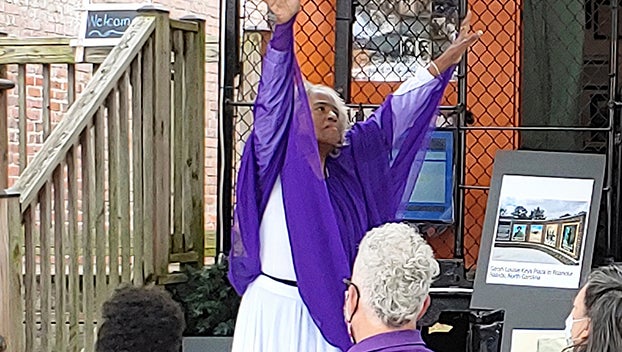Underground Railroad hosts birthday celebration for Civil Rights pioneer
Published 10:18 am Wednesday, April 21, 2021
|
Getting your Trinity Audio player ready...
|
Sarah Louise Keys Evans didn’t attend Sunday’s celebration in her honor at the Washington Underground Railroad Museum. About 30 family members and friends of all ages and backgrounds did though, to celebrate her 92nd birthday. According to event organizers, Evans would have said everyone there made a perfect picture of the kind of world that, for most of her 92 years, the local civil rights icon has stood for – and more pointedly, sat for.
Keys didn’t make the news in 1953 when, at 22 years old, she boarded a bus headed home from Fort Dix in New Jersey. At the Roanoke Rapids stop, the driver told her to surrender her seat to a white Marine Corps member – an order that she refused. Passengers were moved to another bus and Keys, an African American member of the Army Women’s Air Corps, was taken to a police station.
Once finally home, family and friends connected Keys with an attorney who brought her case before the Interstate Commerce Commission – and won. That victory made headlines nationwide, which caught the attention of a young Alabama resident named Rosa Parks. Less than one week later, Parks took courage from Evans’ victory, refused a similar ultimatum and sparked the Montgomery Bus Boycott.
“Fierce, that’s what Sarah was, to take the courageous stand she did,” said Leesa Jones, who is Evans’ cousin and hosted the event at Washington’s Waterfront Underground Railroad Museum, which she co-founded in 2016.
Newcomers among the attendees included Brian Hunter – a white male – and his African American son David, who is adopted by Hunter and his wife. “I believe it is important to recognize very influential African American people who have helped change our country,” Hunter said of the event.
The Hunters sat in rapt attention during historical readings and a proclamation from Mayor Donald Sadler, as well as a worship dance performed by Jones. The proclamation credited Evans for “laying the groundwork” for desegregation but not receiving any recognition for her actions, nationally or locally. Noting that Evans “would like to be remembered as being an unknown national leader in a movement for equality,” the proclamation confirmed Sadler’s feelings by noting that “if it’s not written down, it did not happen.”
Jones agreed with the opinion, adding that much more information is available about her cousin than there used to be. “Just google her name and be inspired,” she said.






